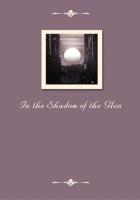Still walking about the room, Nikolay glanced gloomily at Denisov and the girls, avoiding their eyes.
“Nikolenka, what’s the matter?” Sonya’s eyes asked, looking intently at him. She saw at once that something had happened to him.
Nikolay turned away from her. Natasha, too, with her quick instinct instantly detected her brother’s state of mind. She noticed him, but she was herself in such high spirits at that moment, she was so far from sorrow, from sadness, from reproaches, that purposely she deceived herself (as young people so often do). “No, I’m too happy just now to spoil my enjoyment by sympathy with any one’s sorrow,” she felt, and she said to herself: “No, I’m most likely mistaken, he must be happy, just as I am.”
“Come, Sonya,” she said. walking into the very middle of the room, where to her mind the resonance was best of all. Holding her head up, letting her arms hang lifelessly as dancers do, Natasha, with a vigorous turn from her heel on to her toe, walked over to the middle of the room and stood still.
“Behold me, here I am!” she seemed to say, in response to the enthusiastic gaze with which Denisov followed her. “And what can she find to be so pleased at!” Nikolay wondered, looking at his sister. “How is it she isn’t feeling dull and ashamed!” Natasha took the first note, her throat swelled, her bosom heaved, a serious expression came into her face. She was thinking of no one and of nothing at that moment, and from her smiling mouth poured forth notes, those notes that any one can produce at the same intervals, and hold for the same length of time, yet a thousand times they leave us cold, and the thousand and first time they set us thrilling and weeping.
Natasha had for the first time begun that winter to take singing seriously, especially since Denisov had been so enthusiastic over her singing. She did not now sing like a child; there was not now in her singing that comical childish effort which used to be perceptible in it. But she did not yet sing well, said the musical connoisseurs who heard her. “Not trained: a fine voice, it must be trained,” every one said. But this was usually said a good while after her voice was hushed. While that untrained voice, with its irregular breathing and its strained transitions sounded, even connoisseurs said nothing, and simply enjoyed that untrained voice, and simply longed to hear it again. Her voice had a virginal purity, an ignorance of its capacities, and an unlaboured velvety softness, so closely connected with its lack of art in singing, that it seemed as though nothing could be changed in that voice without spoiling it.
“How is it?” thought Nikolay, hearing her voice and opening his eyes wide; “what has happened to her? How she is singing to-day!” he thought. And all at once the whole world was for him concentrated into anticipations of the next note, the next bar, and everything in the world seemed divided up into three motives: “Oh, mio crudele affetto … One, two, three…one…Oh, mio crudele affetto … One, two, three … one. Ugh, this senseless life of ours!” thought Nikolay. “All that, this calamity, and money, and Dolohov, and anger, and honour—it’s all nonsense … and this is what’s the real thing…Now, Natasha! now, darling! now, my girl! … how will she take that si? taken it! thank God!” and without being conscious that he was singing, he himself sung a second to support her high note. “My God! how fine! Can I have taken that note? how glorious!” he thought.
Oh, how that note had thrilled, and how something better that was in Rostov’s soul began thrilling too. And that something was apart from everything in the world, and above everything in the world. What were losses, and Dolohovs, and honour beside it! … All nonsense! One might murder, and steal, and yet be happy.…














